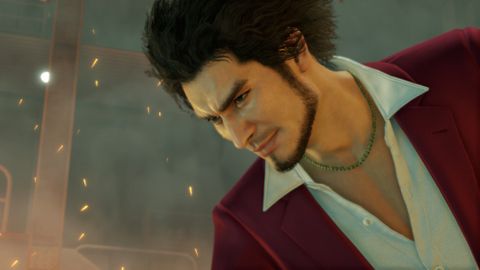The Yakuza series has always delivered good games. Since the first Yakuza released back in 2006, the game has since garnered a cult following that has steadily grown with every release, often blending the underground politics of the Japanese crime world with the mundanity of real-life and the absurdity of an anime. With such a unique mix of themes making up the story, It's only fitting that the DNA of a Yakuza game is also made up of a blend of gameplay genres as well. Describing a Yakuza game is sorta like if Shenmue had a baby with Grand Theft Auto, and that baby decided to beat people up, Streets of Rage style.
Previous Yakuza games built on this blend of genres, crafting a high-quality crime drama that often centers around long-running series protagonist Kazuma Kiryu and the Tojo Clan. Yakuza: Like a Dragon sets itself apart in two major ways; the first is that it's the first entry in the main series that isn't led by Kazuma Kiryu, and second, it swaps the beat 'em up gameplay that has been a staple of the series in exchange for turn-based JRPG combat.
A huge change for sure, but does the gamble pay off? Longtime Yakuza fans will be happy to know that Yakuza: Like a Dragon works exceptionally well and is not only one of the best Yakuza games, it's one of the best games of the year.
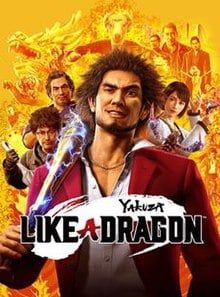
Bottom Line: Yakuza: Like a Dragon swaps out its long-running protagonist and gameplay tropes to magnificent results. The team at Sega has crafted one of the most absurd, most entertaining, and most fun JRPG I've played in years.
For
- Endearing characters and a great story
- A unique turn-based battle system
- Tons of side missions, secrets, and content to explore
Against
- Some of the content might put off Western gamers
- Older fans might not enjoy the shift in genre
What makes Yakuza: Like a Dragon so great?

The first major departure in this entry is swapping out Kazuma Kiryu, the star of the previous mainline Yakuza titles, for Ichiban Kasuga. Unlike Kiryu, Ichiban is more emotive and often wears his emotions on his sleeve. He's not unlike your typical shonen character in this regard. And just like most shonen leads, Ichiban is a bit of an idiot, always jumping to action at a moment's notice, and always does what he believes is right, no matter the danger it puts him in. He's actually a pretty awful yakuza when you think about it. Still, not unlike Kiryu before him, he believes in an idealized version of the yakuza, where honor outweighs the underworld's corruption.
| Category | Yakuza: Like a Dragon |
|---|---|
| Title | Yakuza: Like a Dragon |
| Developer | Ryu Ga Gotoku Studio |
| Publisher | Sega |
| Genre | Action/ RPG |
| Minimum Requirements: CPU | Intel Core i5-3470, AMD FX-8350 |
| Minimum Requirements: GPU | Nvidia GeForce GTX 660, 2 GB | AMD Radeon HD 7870, 2 GB |
| Minimum Requirements: RAM | 8GB |
| Minimum Requirements: OS | Windows 10 |
| Platforms | PC, Xbox One, Xbox Series X/S, PS4. Coming to PS5 March 2021. |
| Game Size | 55.7GB |
| Play Time | 80+ hours |
| Players | 1 player |
| Price | $60 on Steam |
Ichiban's story starts in 2000 when he is just a young low-ranking yakuza who is asked a favor by his patriarch, Masumi Arakawa, who he sees as a father to him. The favor? Serve a prison sentence for a murder he did not commit. Eighteen years later, Ichiban is released to a world that is unfamiliar to him. Without giving away any spoilers, the story explores the "gray" areas of Japanese society and the broken people that exist between the cracks. The illegal activities, as many as there are, are often a means of survival in a society that sees those people as lesser than. Whether it's gang life, homelessness, prostitution, or immigration, Yakuza: Like a Dragon never condemns a person's situation, often shining a sympathetic light on the character instead.
It is what I found most endearing about the game as I was playing, and the characters expand on this thread. Ichiban is a middle-aged ex-yakuza who amasses a party of friends that consist of a homeless guy, a bartender, and a disgraced cop. These characters have tragic tales tied to them, but it's Ichiban's endless enthusiasm that convinces them that they can be heroes if they only give themselves a second chance. Ichiban is so good-hearted that it's hard not to love him, and he grows on you the same way he grows on his new friends. I was invested in all of these strikingly human characters whose flaws stem from them being dealt a bad hand in the game of life.
Special mention should be made to the excellent English dub. Breaking away from another long-standing tradition, this Yakuza marks the first time in fifteen years that the game is receiving an English dub. Including voice work from George Takei, the main voice cast sounds great, though sometimes the side characters sound a little too similar to one another. The Japanese audio is also available for purists who can't stomach the thought of listening to a dub.
Life is really like an RPG when you think about it
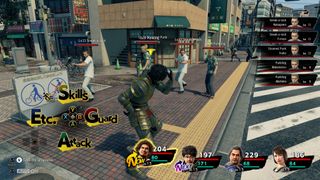
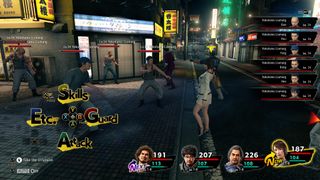
Source: Windows Central / Zackery Cuevas
Ichiban happens to be a massive gamer and a fan of Dragon Quest in particular. This is where Yakuza's second major departure comes into play. Tossing out the beat 'em up style fighting that made up previous entries, Yakuza: Like a Dragon is an RPG in the traditional sense. While previous games dabbled in RPG elements before, Yakuza: Like a Dragon goes all out by introducing a traditional turn-based battle system, with some key changes.
Early in the game, Ichiban exclaims that life is like an RPG and that we're constantly grinding for experience to level up in the world. It's through his gamer brain that the game transforms, both in a figurative and literal sense. Wandering gangs in the streets become roaming predators ripe with experience points, gang hideouts morph into dungeons, and your party transforms before your very eyes as they take fighting stances.
Yakuza: Like a Dragon borrows heavily from the recent Dragon Quest XI. When a battle begins, you and your party move around the arena, waiting for a command. Battles are far from static, though, as the game makes a few changes to the formula to keep battles as dynamic as possible. When using skills, players must time their button presses or tap a button repeatedly to ensure maximum damage. Players can also block an incoming attack with a well-timed button press.
The environment also plays a role in combat. You don't have control over your character's movement, but if you're able to line them up with the destructible environment, you may be able to score extra damage from a bench or a flowerpot. Another interesting mechanic is the ability to score massive damage by hitting an opponent while they are down. If an enemy is knocked over, you have a window of opportunity to deliver a follow-up attack that does extra damage. Sometimes party members even follow up attacks on their own. If battles become too much for you, you can also set the game on autopilot and have the game fight for you. You will still be responsible for button presses, however.
Respect your elders
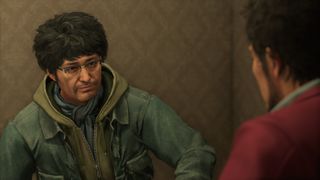
In addition to the clear inspiration from Dragon Quest, I also found elements of classic RPG games like Earthbound throughout. There are no psychic powers to be found, but the weapons and armor are not typical fantasy wares. Your party's arsenal is made up of real-world items like baseball bats, handbags, and office supplies, and they cast spells with umbrellas and bottles of booze. This also applies to items as well, as characters scarf down bento boxes and chug a soda to recover hit points.
Your party's arsenal is made up of real-world items like baseball bats, handbags, and office supplies
Things start to verge into the absurd once you're able to manage your character's job. Like real life, we're often defined by the jobs we do, and it's no different in Yakuza: Like a Dragon. Like in most RPGs, a job defines your character class and appearance. In Yakuza: Like a Dragon, The traditional jobs of JRPGs are reimagined as real-world jobs. That means when you choose to be a club host, you attack by spraying your enemies with champagne, or if you become a breakdancer, you can specialize in multi-hit attacks by busting out some headspins and handstands. Each party member also comes with their own unique class. There's a good amount of variety here that should satisfy die-hard RPG fans while also being user-friendly enough that even newer players can quickly pick it up.
It's clear that the development team at Ryu Ga Gotaku took the time to really capture the momentum felt in a beat 'em up game and found a way to translate that to a JRPG. Returning fans might experience some whiplash from the changes, but if you're a fan of JRPGs of any kind, Yakuza: Like a Dragon delivers and stands as one of the best JRPGs I've played.
Looks like a yakuza, dresses like a yakuza, so it must be a yakuza
Yakuza: Like a Dragon might feature a new protagonist, a fancy English dub, and totally new gameplay, but all the ridiculousness that has defined previous Yakuza games remains firmly intact in this latest entry. Choose to complete one of dozens of side quests found around the district of Yokohama, compete in some go-kart racing, take a test at a vocational school, run a senbei business, play a few rounds of Virtua Fighter 2, and of course, there's karaoke. Each side mission adds to the district's richness and varies from ridiculous to over the top anime-esque craziness. Yakuza manages an almost perfect balance between the uber violence of its gang politics with the uber insanity of city living.
Each side mission adds to the district's richness and varies from ridiculous to over the top anime-esque craziness.
The richness of the city begins to reveal itself to you the more you explore, and it constantly rewards you for almost everything you do. Included in the game is a bond system, which can be leveled up to improve Ichiban's relationship with his party. You increase your bond with your party by fighting alongside them, listening to their stories, and even enjoying a meal with them. Like real life, you grow closer to your friends as you learn about their personal struggles, their passions and dreams, and their favorite foods. Cultivating those bonds will unlock tag team moves between Ichiban and the other party members to use in battle.
Also, Ichiban has six personality traits that shape how people perceive him. By building your kindness, passion, style, confidence, charisma, and intellect, you can hire more qualified employees for your business and even woo a romantic prospect or two. None of this necessary to completing Yakuza, but it adds so much to the game's personality that it's almost impossible not to sink yourself into.
Not everyone's cup of tea
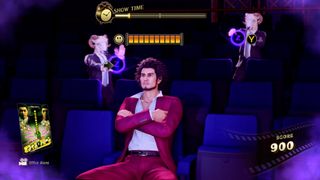
Yakuza: Like a Dragon is a game about Japanese gangsters and is an unabashedly Japanese game. As such, the customs and sensibilities are different than those in the west. I had no problem with any of the subject matter or the bounty of anime tropes throughout the game, but it is worth noting to those who are sensitive about such topics.
Yakuza revels in the moral gray areas that exist in Japanese society.
As I mentioned previously, Yakuza revels in the moral gray areas that exist in Japanese society. Ichiban is a gangster and part of an organization that kills people, launders money, and deals in prostitution, and yet he is proud of the honor and brotherhood that comes along with it. And while it is toned down compared to previous Yakuza games, which featured Japanese porn actresses and let you run an actual brothel, there's still a lot of mature content here, though, in actuality, it's no worse than a GTA game.
Besides, I'm not playing Yakuza for any take on real-world sexism, sex work, gang life, immigration, or the necessity of violence. Yakuza: Like a Dragon finds power exploring these gray areas, and it serves the story incredibly well, even more so than other Yakuza titles.
The cracks in between
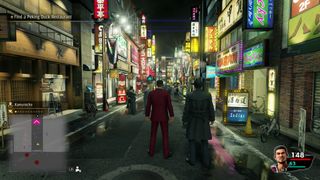
For the most part, I really enjoyed the new battle system, but it verges on the easier side for most of the game, and then there's a sharp difficulty spike as you approach the final chapters. While Ichiban might not mind grinding slimes for XP, it's a drag to do so in an RPG. Thankfully, there are plenty of options to grind XP with, and with the auto-battle on, it's simple, if not a little boring. Speaking of boring, like any good JRPG, the game really picks up after the first few hours. Until then, you'd better get comfortable cause it's going to be very cutscene heavy in the beginning.
The huge gameplay changes might turn off returning fans of the series. Yakuza: Like a Dragon is a game with a lot of depth, and while it does a good job at explaining some of the complicated systems, it is a JRPG, and if JRPGs aren't your thing, Yakuza might be alienating to you, from its turn-based gameplay to its eager beaver protagonist.
Most cutscenes just boil down to character models standing still and as they spew dialogue and exposition.
From a technical standpoint, Yakuza: Like a Dragon does its job well enough. In fact, Yakuza has never looked better, and there are times where the crowded streets look like a scene pulled from a movie, but most cutscenes just boil down to character models standing still and as they spew dialogue and exposition. It's not a game-breaker by any means, but it's very noticeable, and the dollhouse animations and thousand-yard stares often kill the immersion felt in those busy streets.
This game isn't a next-gen showcase, but it doesn't need to be. While Yakuza: Like a Dragon will be available on current and next-gen consoles, if you have the choice, there's no reason not to play it on your PC to get the best performance.
Is Yakuza: Like a Dragon worth the download?

When I first learned of the new features in Yakuza, I was cautiously optimistic about the game. Yakuza has enjoyed a great amount of success in the east and west, so it's safe to say that expectations were high and rightfully so. Thankfully, Yakuza: Like a Dragon sticks the landing and is the craziest entry in the series yet. From beginning to end, I was invested in the cast of characters and the over the top situations Ichiban and his motley crew find themselves in.
From the combat to the side stories and all the minigames in between, I still can't put Yakuza: Like a Dragon down. Even forty hours in, I keep finding new mini-games to play and new stories to uncover. Yakuza: Like a Dragon is a game that keeps on giving, and just when I think I know what's coming, it surprises me with something totally out of left field. If you've ever been interested in the Yakuza games, this a fine place to start, and for returning fans, once you get past the RPG trappings, you'll find a familiar friend in brand new clothes.
Yakuza: Like a Dragon feels like everything I ever wanted in a game. Once the game stomps on the gas, it very rarely slows down. Its unique cast of characters and gameplay had me hooked and wanting more, and it almost feels like it never stops giving. Even after the story ends at the 45+ hour mark, I was ready to fight more, complete more side missions, and squeeze out every drop of gameplay that this game has to offer.
Yakuza: Like a Dragon is one of the best games of 2020 and one of the best RPGs in recent memory. This game is something extraordinary and should not be missed.
Yakuza: Like a Dragon releases on Nov. 10, 2020, for PC, PS4, Xbox One, and Xbox Series X/S. It'll also be available on the PS5 on March 2, 2021.

Not a loser!
Yakuza: Like a Dragon is a departure for the series in many ways, but it manages to hold onto the elements that make Yakuza games great while introducing a brand new set of RPG rules. This is one of the most entertaining, bizarre, and ridiculous RPGs I've played and one of the best games of the year.
Zackery Cuevas is a writer for Windows Central, Android Central, and iMore. I like playing video games, talking about video games, writing about video games, and most importantly, complaining about video games. If you're cool, you can follow me on Twitter @Zackzackzackery.
